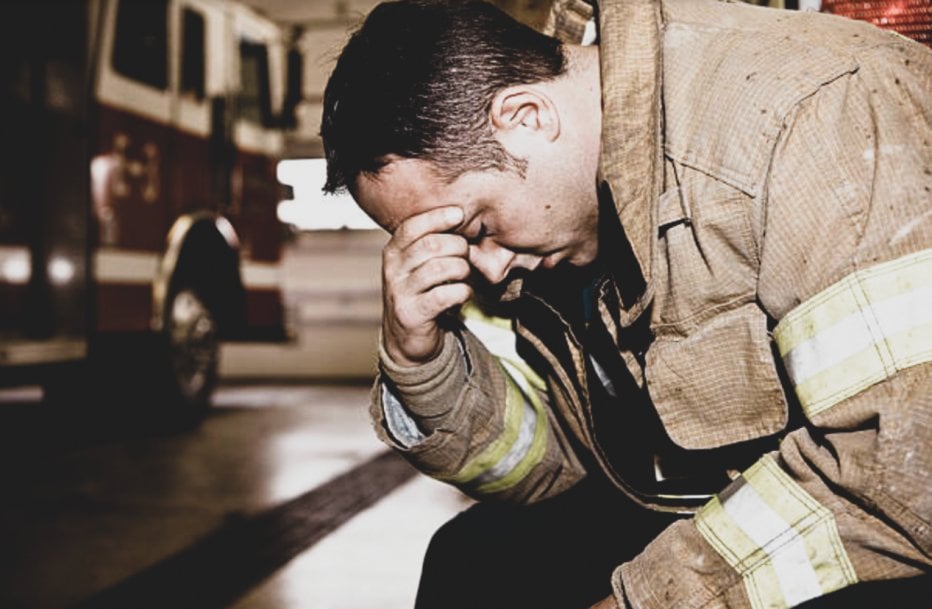Mental Fitness & Firefighting

By Tori Mikulan
Training never ends for firefighters. We continually train so that our skills stay sharp so we’re ready to go when it is time to put them into action. Training is more than just practicing individual skills. Keeping up on physical fitness or regular exercise is a training component to help our preparedness, improve performance, and serves as a preventive measure by possibly lessening the chance of injury.
You really can’t argue against maintaining physical fitness. We know what the benefits are. We’ve seen them in action or, conversely, we have seen the consequences when you aren’t prepared.
So what about our mental fitness? Over the last decade, firefighter deaths by suicide have increased to the point of surpassing deaths in the line of the duty; an undeniable, serious problem that has brought mental health to the forefront of fire service issues.
Increasing Awareness
Kimberly Quiros, Chief of Communications at the National Volunteer Fire Council (NVFC), states that while awareness on the importance of mental health and wellbeing is improving, stigma is still a major issue in addressing mental health issues. She says, “We are still battling a culture that may consider it a weakness to admit they may be impacted by what they see and do on the job and that the misconception that responders should ‘suck it up’ remains. This is a stigma we must continue to work to overcome.”
Increasing awareness on the importance of mental health and wellbeing while eliminating stigma are just part of the equation to maintaining and treating mental health. Provided resources improve and increase recognition of signs and symptoms, promote treatment options, and provide treatment. And there are a wide variety of such resources available. However, are we taking advantage of these resources? Does the average firefighter know what is available?
The answer is mixed. IAFF Behavioral Health Specialist Lauren Kosc, MA, LCPC, says that it varies widely from department to department and city to city. Kosc explains, “Fire departments that advertise and promote available behavioral health services to their members will have a better service utilization and a healthier workforce.” However, she adds that it is not uncommon for firefighters to only learn about department behavioral health resources once they are in crisis.
Self-Care
Quiros noted that many first responders are focused on helping others and forget that they need to also focus on their own mental health and wellbeing. Other barriers to treatment include that many do not see a benefit to addressing their mental health if they aren’t experiencing an issue and that while many first responders support others reaching out if they need help, they don’t think it is for them or that they may need help.
Too often, first responders wait until there is an issue or they are in distress before choosing to address their mental health. Emergency responders deal with stress, traumatic incidents, and other issues on a daily basis that can impact mental health. Volunteer firefighters may face additional challenges such as balancing a full-time job, volunteering, and family life. In smaller communities, they may know the victims or victims’ families.
“We need to emphasize that it is okay to get help to deal with these things, and that it is a sign of strength to recognize the importance of mental wellbeing,” Quiros commented.
She further explained that cumulative stress and ongoing exposures to traumatic incidents can cause a negative mental health impact on first responders, making it critical for first responders to develop positive coping mechanisms prior to having an issue. Not only does this help responders tackle those future obstacles, but it can also help prevent unhealthy coping mechanisms, such as drug or alcohol abuse, and outcomes including burnout, unmanageable temper, and suicide from developing.
Ways to combat stress include having someone to talk to on a regular basis and having a support system. Therapy can help provide you with someone to regularly speak to and develop positive coping mechanisms.
Resiliency
Additionally, continual resiliency development is a method that Quiros and Kosc both promote. Building resiliency is critical to developing positive coping mechanisms.
The IAFF offers Resiliency Training that utilizes self-assessment, group work, and didactic instruction that provides participants with a foundation for personal resiliency for both off and on the job stressors.
Students learn how to assess their current level of resiliency, challenge toxic thinking and personal and occupational barriers to proper nutrition and exercise, reduce the physiological response to stress, and to build daily meaning and purpose through spirituality, along with experiencing more joy each day.
Kosc explains, “Despite recent strides made to address post-traumatic stress, substance abuse, burnout and suicide in the fire service, we still have a long way to go. The IAFF Resiliency Training addresses this reality by teaching members of any level of rank how to be more resilient members of their department and promote organizational change. Every fire fighter can learn something from the IAFF Resiliency Training. Resiliency training prepares fire fighters to cope with life’s inevitable daily challenges and come out stronger on the other end.”
The training is available to any fire service personnel. Individuals can sign up and register for the IAFF Virtual Resiliency Training. Training hosted by an individual IAFF affiliate for their fire department or IAFF requires non-IAFF members to obtain permission from the IAFF affiliate president to attend that training.
Several stress management skills included in the training are mindfulness, tactical breathing, grounding, guided imagery, and an introduction to yoga and are proven to reduce the physiological stress, both off and on the job.
While Kosc acknowledges that some of the skills, such as meditation and yoga, are “traditionally” viewed as “touchy-feely,” the IAFF is working to shatter those misconceptions and help firefighters understand what they can gain from learning these skills.
“Having evidence-based methods to manage occupational and personal stress is essential to surviving in the fire service. We find that most personnel are extremely receptive to learning these skills,” Kosc commented.
Additional Resources
Additional behavioral health resources offered by the IAFF include the IAFF Online Behavioral Health Awareness Course, which is free and open to public.
Kosc calls the two-day IAFF Peer Support training the cornerstone of IAFF’s behavioral health program and is available both in an in-person and virtual format. IAFF also provides online suicide prevention training, disaster peer support training, post-disaster peer support deployments, mental health clinician training, opioid addiction training, live online recovery meetings, as well as ongoing technical assistance to IAFF affiliates.
The IAFF Center of Excellence in Behavioral Health Treatment and Recovery is the IAFF’s residential behavioral health treatment center, located just outside of Washington, DC. The treatment center has helped restore the lives of over 1,900 IAFF members from all over North America since opening in 2017. Expanding treatment access to their West Coast and Canadian affiliates and expanding in-person and resiliency training are future goals for the IAFF. These resources can be accessed at https://www.iaff.org/behavioral-health/.
The NVFC is also addressing behavioral health in the fire service through the Share the Load program to build a stronger, healthier, and more resilient fire service. The campaign is designed to break the stigma around behavioral health issues in the fire and EMS services by establishing mental wellbeing as a priority, opening up dialogue in departments, and providing resources such as guides, trainings, and videos. Some resources enable individual responders and department leaders to understand the importance of addressing behavioral health and to recognize the signs that indicate someone needs help, while others provide departments and emergency personnel with tools to help prevent tragedies such as suicides. Two programs that Quiros believes are Share the Load’s most effective programs are the Directory of Behavioral Health Professionals and the Psychologically Healthy Fire Departments: Implementation Toolkit. She explains, “The Directory of Behavioral Health Professionals is a listing of local mental health providers that are ready and equipped to help firefighters, EMS providers, and their families. All providers in the directory either have firsthand experience with the emergency services or have been trained and vetted by the Firefighter Behavioral Health Alliance to ensure they understand the unique needs of emergency responders. The Psychologically Healthy Fire Departments: Implementation Toolkit is a resource for department leaders to help them promote and foster well-being among their members and create successful, high-performing departments. The toolkit provides guidance to departments to make sure they are creating an environment that fosters a psychologically healthy membership to prevent and alleviate many of the issues that can lead to behavioral health challenges among responders.”
The NVFC continues to work to develop and offer behavioral health tools, resources, and training.
Continue the Conversation
The conversation on mental health and wellbeing in the fire service has just begun. Acknowledging that maintaining mental health is an ongoing process and includes taking action despite lack of crisis is a major stride in continuing that conversation and leading towards a more resilient fire service. Actively assessing and responding to your mental health is beneficial to firefighter’s off and on the job, just as it is for physical health.
Why would you argue against it?
Podcast
Contests & Promotions
















